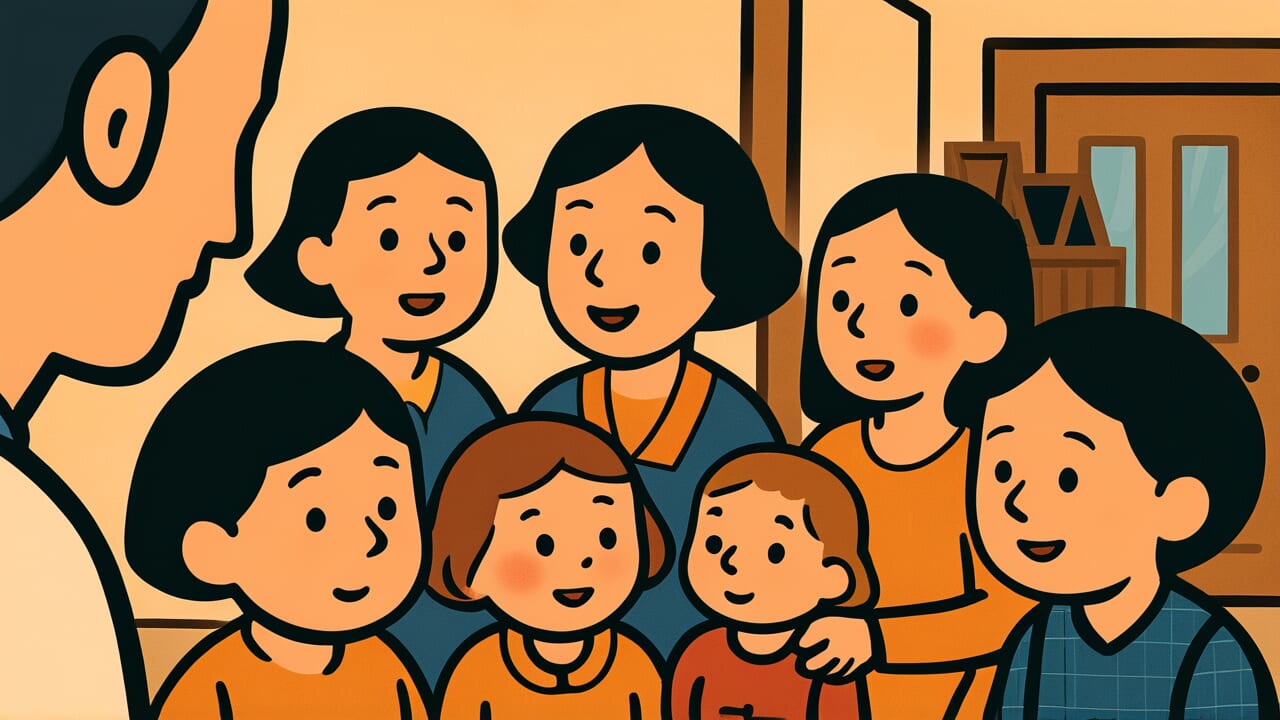How to Read “Poor people have many children”
びんぼうにんのこだくさん
Meaning of “Poor people have many children”
This proverb describes a social phenomenon where economically disadvantaged families tend to have more children.
Wealthy families plan their children carefully, thinking about education costs and inheritance. In contrast, poor families often end up having many children.
This reflects a pattern people have observed throughout history.
People use this saying when they see a poor family with many children. It also comes up when discussing the relationship between economic situations and family planning.
The expression serves more than just stating facts. It captures life’s irony and the complexity of human society that doesn’t always go according to plan.
Today, people sometimes connect it to rising education costs and economic inequality. However, it originally wasn’t meant as moral criticism.
It simply described a social phenomenon objectively.
Origin and Etymology
No definite records show exactly when this proverb first appeared. However, people likely used it widely during the Edo period.
The phrase combines two contrasting elements: “poor people” and “many children.” People noticed this puzzling pattern through everyday observation.
Why would families without economic means have so many children?
The social structure of the Edo period helps explain this proverb’s origins. Wealthy merchants and samurai families intentionally limited their children.
They worried about inheritance and dividing family assets. Meanwhile, common people like farmers and craftsmen valued children as workers.
They also had limited knowledge and access to birth control methods. This naturally led to larger families.
Some theories suggest poor families had fewer entertainment options. Intimacy between spouses became a main source of enjoyment.
Also, infant mortality rates were high back then. Anxiety about the future may have driven families to have more children.
These various factors combined created the real-life observation behind “Poor people have many children.” People shared this experience, and it became an established proverb.
Usage Examples
- That family is a case of poor people have many children—they’re raising six siblings
- They say poor people have many children, and our family was exactly like that
Universal Wisdom
“Poor people have many children” reveals a universal truth about the gap between planning and reality in human society.
Everyone wants to design their life rationally. But reality shows an ironic pattern.
People with economic security plan carefully. Those without it tend to let things happen naturally.
This isn’t simply about being careless. It shows human limitations when daily survival leaves no mental space for long-term planning.
The proverb also contains a deep insight. Happiness and economic wealth don’t always match.
Having many children may be an economic burden. But it brings different riches—family bonds and the joy of living.
Our ancestors understood that life holds values beyond calculation.
This proverb has endured because it addresses a timeless issue. It captures the conflict between human reproductive instinct and social constraints.
Reason tries to control, but instinct and emotion pull us in different directions. Our ancestors keenly observed this duality in human nature.
They condensed it into one proverb. It’s neither criticism nor praise—just deep understanding of what it means to be human.
When AI Hears This
Biologists have discovered a surprising pattern. Fish lay thousands of eggs at once but provide almost no care.
Elephants, on the other hand, give birth to one calf every few years. They spend over a decade raising each one.
What explains this difference?
The answer is environmental stability. The ocean where fish live has many predators. There’s no guarantee of surviving tomorrow.
So they compete through numbers. Scientists call this the r-strategy.
In contrast, large animals like elephants live in stable environments. They invest heavily in each offspring—the K-strategy.
Research confirms that even within the same species, offspring numbers increase in areas with unstable food supplies. They decrease in stable regions.
Humans are no exception. Economic instability increases uncertainty about the future.
This unconsciously triggers a quantity strategy—”if at least one survives.” In stable environments, the strategy shifts to quality.
Parents concentrate education and time on fewer children. Statistics show an inverse relationship between income and birth rates worldwide.
This proverb suggests something profound. Family planning that we think we decide rationally may actually be influenced by survival programs built into living things over hundreds of millions of years.
Beneath human choices, biological instinct lurks.
Lessons for Today
This proverb teaches modern people about the weight of freedom and responsibility in life choices.
Modern society respects family planning as a personal choice. But the proverb quietly reminds us that such choices require economic preparation and resolve.
Having children is a major life decision that can’t be reduced to calculations alone.
If you’re thinking about your life plan now, this proverb offers perspective. Waiting for economic stability before starting a family is one valid choice.
Building a family in your current situation is another. What matters is taking responsibility for your choice and doing your best within it.
The proverb also questions society as a whole. Is it acceptable for economic inequality to determine family structures?
Have we created an environment where all families can raise children with peace of mind?
While respecting individual choices, we must consider systems of mutual support. This may be the challenge for those of us living today.



Comments